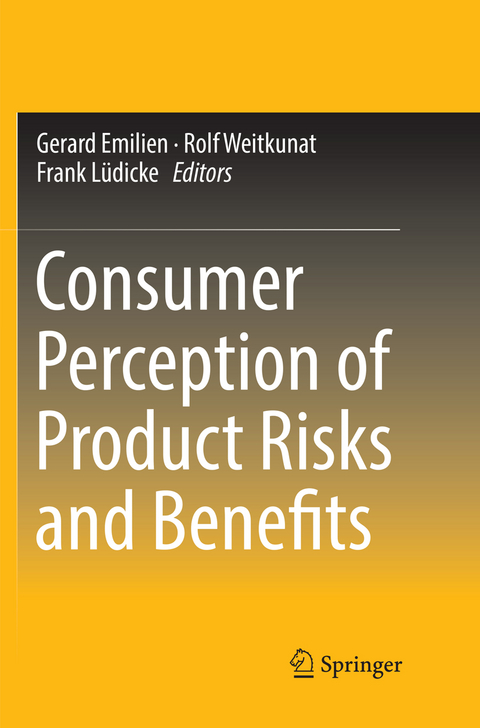
Consumer Perception of Product Risks and Benefits
Springer International Publishing (Verlag)
978-3-319-84421-3 (ISBN)
This book reflects the current thinking and research on how consumers' perception of product risks and benefits affects their behavior. It provides the scientific, regulatory and industrial research community with a conceptual and methodological reference point for studies on consumer behavior and marketing. The contributions address various aspects of consumer psychology and behavior, risk perception and communication, marketing research strategies, as well as consumer product regulation. The book is divided into 4 parts: Product risks; Perception of product risks and benefits; Consumer behavior; Regulation and responsibility.
Gerard Emilien is a Clinician whose research interest is focused in Neuropharmacology, Neuropsychiatric diseases and Psychology. A University graduate of Liege University, Belgium, he completed a Diploma in Clinical Neurology from University College London. Gerard is also a fellow of the Royal College of Physicians from UK (Glasgow and Edinburg). He started his clinical research career in the department of Pharmacology at Liege University before he moved to clinical research in Pharma. With his clinical research background in academia (Visiting Professor in Neurology from Louvain University) and Pharmaceutical industry, he has authored several books and scientific papers in the behavioral sciences & Neuropsychiatry in peered review journals. Gerard was also Project Director in Clinical Neuroscience for Pfizer for 16 years where he was responsible for CNS projects and was involved in 3 successful global Marketing Authorization dossiers. Rolf Weitkunat joined PMI in 2005, after being a senior lecturer at the School of Public Health and Epidemiology of the Medical Faculty of the University of Munich, Germany, from 1993 on. Habilitation (assistant professor/state doctorate) in biometry and epidemiology in 2001. Previously (1990-1992) working in the biostatistics department of a clinical research organization and as a post doc at the University of Munich. Primary academic training in clinical psychology and neurophysiology, University of Tübingen, Germany (doctorate in psychology in 1987). Currently lecturing epidemiology at the universities of Munich (Germany) and Fribourg (Switzerland). Areas of research include smoking and health, behavioral and social epidemiology, statistical computing, signal processing, meta-analysis methods, and others. Various publications include books on signal processing, statistical computing and methods and concepts of behavioral and social epidemiology, as well as articles in peer-review journals. Frank Lüdicke joined Philip Morris International as Director of Product Assessment, within PMI’s Research & Development division. In this role Frank leads the preclinical and clinical team for the development of innovative tobacco products as part of the Product Assessment and Scientific Substantiation program (PASS). After obtaining his medical degree 1988 in Berlin, Germany and his medical thesis done at the Max-Planck Institute, Freiburg, Germany, Frank joined Schering AG, Berlin as Clinical Researcher in the field of endocrinology. He received his postgraduate training and hold the position as Assistant Professor at the Department of Obstetrics and Gynecology, Geneva, Switzerland. In this role he successfully raised funds and carried out several clinical and preclinical research projects. Frank has served as scientific advisor to the WHO for Reproductive Health in Eastern Europe and has co/authored more than 30 peer reviews publications. Prior to this appointment, Frank served as Clinical Program Leader at Sandoz Biopharmaceuticals and headed global clinical development teams in the field of oncology.
Product Risks: Types of Consumer Products.- Risks of Consumer Products.- Non-clinical Research-Based Product Assessment.- Clinical Research-Based Product Assessment.- Epidemiological Product Assessment.- Individual and Population Risks.- Risk Communication.- Perception of Product Risks and Benefits: Comprehension of Products and Messages.- Perception of Product Risks.- Measuring Risk Perception.- The Perception Risk Instrument (PRI).- Role of Emotions in Risk Perception.- Rational Choice and Bounded Rationality.- Temporal Discounting of Future Risks.- Cognitive Styles and Personality in Risk Perception.- Consumer Values and Product Perception.- Consumer Behavior: Perception, Attitudes, Intentions, Decisions and Actual Behavior.- Consumer Products and Consumer Behavior.- Consumer Resistance: From Anti-consumption to Revenge.- Motivation.- Marketing and Market Research.- Consumer Behavior Research Methods.- Use, Abuse and Misuse.- Consumer Behavior in Subpopulations.- Regulation and Responsibility: Regulatory Prospective for Medicinal Products.- Regulations of Consumer Products.- Manufacturer Responsibilities.- Consumer Responsibilities.- Society and Policy Maker's Responsibilities.- Consumer Perceptions of Responsibility.
| Erscheinungsdatum | 05.03.2022 |
|---|---|
| Zusatzinfo | XXIV, 596 p. 55 illus., 23 illus. in color. |
| Verlagsort | Cham |
| Sprache | englisch |
| Maße | 155 x 235 mm |
| Gewicht | 9241 g |
| Themenwelt | Wirtschaft ► Volkswirtschaftslehre ► Mikroökonomie |
| Schlagworte | Consumer Behavior • Consumer Perception • Perception Risk Instrument • Product Benefit • Product Risks • Product Safety Surveillance • Rational choice • risk assessment • Risk Perception |
| ISBN-10 | 3-319-84421-0 / 3319844210 |
| ISBN-13 | 978-3-319-84421-3 / 9783319844213 |
| Zustand | Neuware |
| Informationen gemäß Produktsicherheitsverordnung (GPSR) | |
| Haben Sie eine Frage zum Produkt? |
aus dem Bereich


